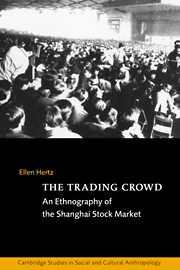Book contents
- Frontmatter
- Contents
- List of illustrations
- Preface
- Acknowledgments
- List of abbreviations
- Conversion rate
- Introduction: Ways and means
- Part I
- 1 First contact
- 2 The Shanghai stock market and the tributary state
- 3 Stock fever (gupiao re)
- 4 City people, stock people
- Part II
- Glossary of Chinese terms
- Bibliography
- Index
- More titles in the Cambridge Studies in Social and Cultural Anthropology series
4 - City people, stock people
Published online by Cambridge University Press: 05 June 2012
- Frontmatter
- Contents
- List of illustrations
- Preface
- Acknowledgments
- List of abbreviations
- Conversion rate
- Introduction: Ways and means
- Part I
- 1 First contact
- 2 The Shanghai stock market and the tributary state
- 3 Stock fever (gupiao re)
- 4 City people, stock people
- Part II
- Glossary of Chinese terms
- Bibliography
- Index
- More titles in the Cambridge Studies in Social and Cultural Anthropology series
Summary
When I arrived in Shanghai in February 1992, there were a reported 300,000 stock accounts at brokerages throughout the city; when I left in December, that number had jumped to 1,300,000 (Wei 1993:7). Approximately 50 percent of these accounts were held by investors outside Shanghai who purchased shares through regional brokerages with seats on the Shanghai Exchange (ibid). Granting that Shanghai investors would frequently band together to play the market through a single account, we may presume that at least 700,000, very likely a million Shanghainese, were actively investing in stocks at the height of the fever – that is to say, 8 percent of Shanghai's 13 million inhabitants. We are thus faced with a puzzle: why do the activities of 8 percent of the population constitute a “fever”? Why was I consistently told that “everyone” was playing the stock market?
Clearly, the rhythm of entry into the market had something feverish about it. In the course of twelve months, participation in the market more than quadrupled. But, the social fact of stock fever is constructed culturally, not mathematically. What struck the Shanghainese was that, unlike many of the new opportunities created by the policy of “reform and opening,” participation in the stock market cut across all social classes and categories. Only the very well connected could send their children to study abroad, and only “ex-prisoners and the unemployed” would stoop to opening an individual business.
- Type
- Chapter
- Information
- The Trading CrowdAn Ethnography of the Shanghai Stock Market, pp. 94 - 126Publisher: Cambridge University PressPrint publication year: 1998
- 1
- Cited by

